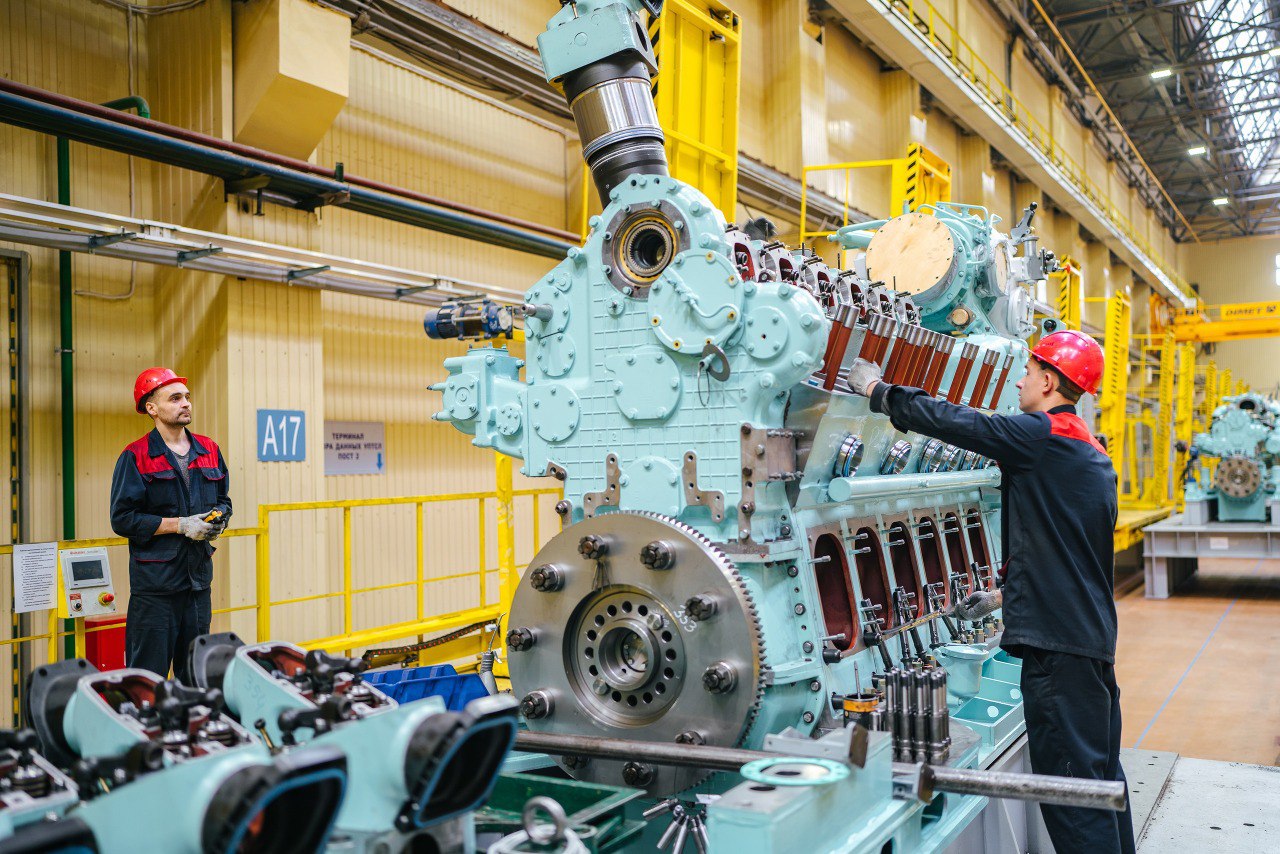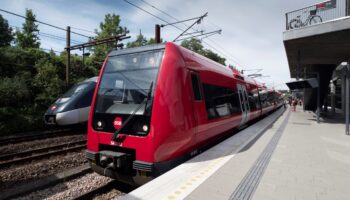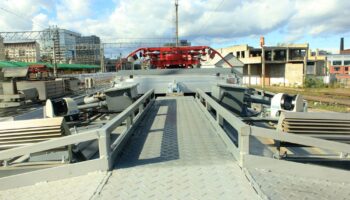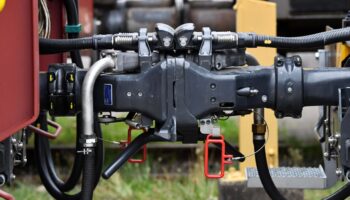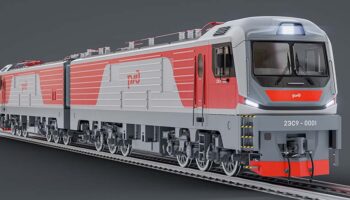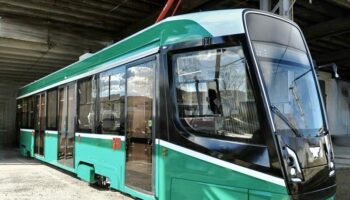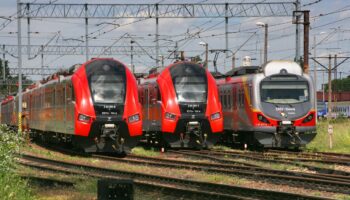Russia: The latest Concept of Technological Development approved by the Russian Government requires the country’s dependence on imported technologies to be reduced from 68% to 27%. The breakthrough needs to be made in the production of engines and power units as well. Technological independence will be ensured mainly through the efforts of major market players that have production, design, scientific, and educational capacities. TMH, Russia’s leading rolling stock manufacturer, headed for self-sufficiency in the power unit sector long before the recent sanctions.
It started with consolidating resources
In the middle of the 2000s, TMH acquired the Kolomna plant and Penzadieselmash, leading Russian producers of diesel engines. Significant investments were required and made to restore them after the collapse of the Soviet economy and stagnation of the end of the last century. Today these supply state-of-the-art diesel engines and turbochargers not only for the needs of the holding. Mine trucks and small-scale and nuclear power plants also use their products. In 2018, TMH established a subsidiary company in Novocherkassk, TMH Elektrotekh, which produces commutator and asynchronous electric motors and generators for rolling stock.
Together with Zavod AIT, a leading Russian manufacturer of autonomous power supply systems, and several other plants, these three production sites are a part of TMH Power Solutions (TMH ER). Established in 2020, the company aims to provide customers with a full set of engineering services, and these relate not only to diesel or electrical traction but also to gas and hydrogen. Its strategic partner is the Rosatom State Corporation, while its business in various industries in Russia and abroad is promoted by its subsidiary, Rusatom Overseas.
All of the above companies make a major contribution to the expansion of the range of components offered by TMH and the implementation of the holding’s Strategy 2026 for technological development. TMH continues to modernise TMH ER facilities. Such an ambitious project would be impossible without the significant support from the Industrial Development Fund and the use of other state-funded instruments. As a result, even under the pressure of sanctions, the holding is rapidly replacing imported aggregates with Russian ones and promptly responding to the requests of its subsidiaries.
The Kolomna Plant is turning into a business cluster
We see the most impressive changes at the Kolomna Plant. In Russia, this is the main supplier of medium-speed diesel engines and the only manufacturer of mainline passenger diesel locomotives and DC electric locomotives.
Over RUB 12.5 bln ($130 mln) were invested in the plant between 2018 and 2022 to make possible its drastic modernisation. More than 200 units of metalworking machinery have been installed here, and a fleet of lifting equipment and a cylinder block processing shop have been upgraded. A competence centre was set up for the production of components for fuel injection equipment that do not require manual finishing, while improvements in the assembly shop support future output growth. The plant mastered the repair of diesel locomotives and engines. Another outstanding result of the modernisation is the creation of TMH’s Engineering centre for diesel engine development, which employs 260 designers.
In September 2023, the plant received an engine test facility worth RUB 3.4 bln ($36 mln). It will allow a multiple increase in capacities for acceptance testing of both new engines and those under overhaul. The facility of about 9,000 m2 has 12 test benches, each in a separate fire- and sound-insulated box and controlled by an automated system.
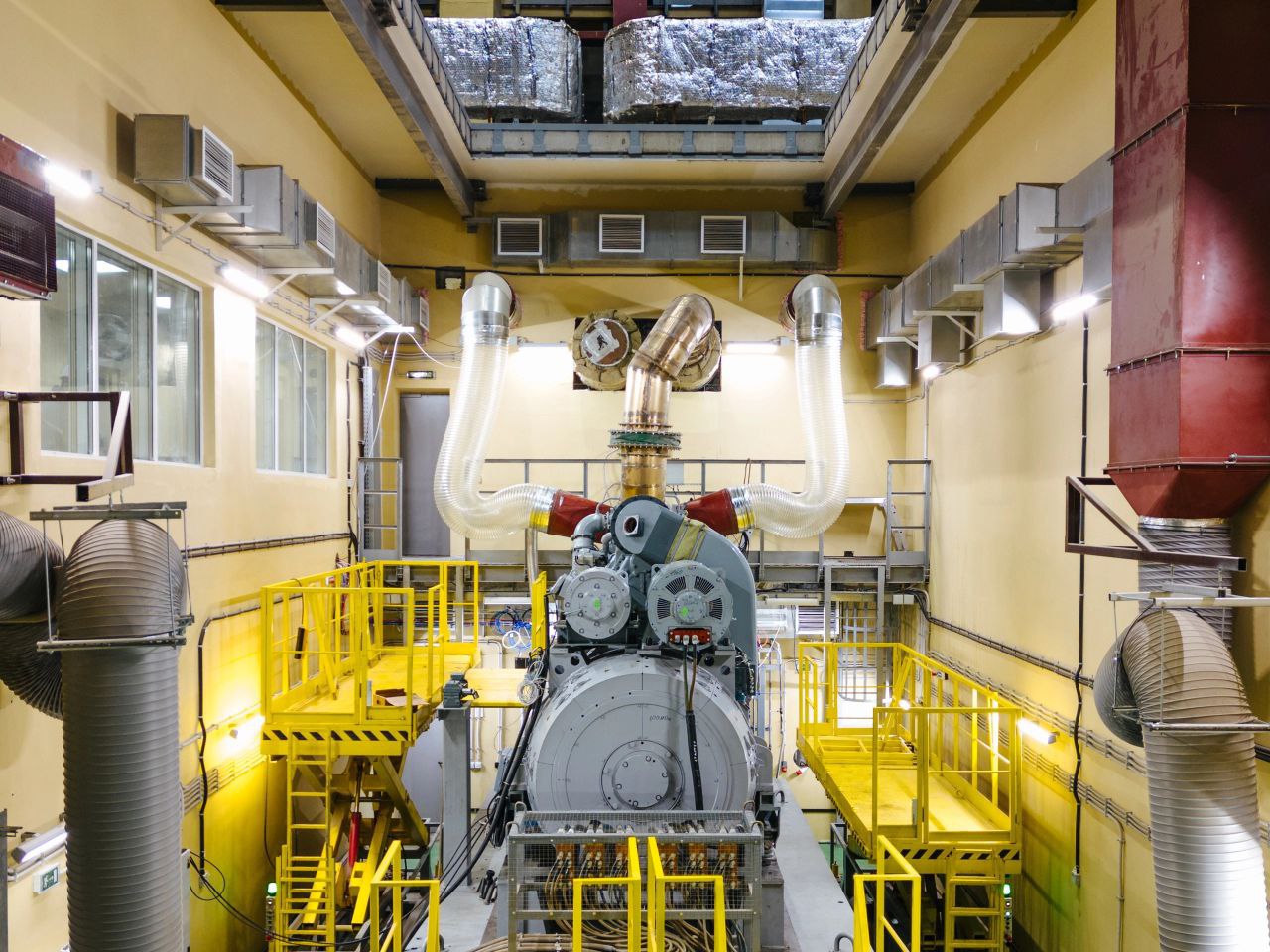 A test bench at the engine test facility at the Kolomna Plant. Source: kolomnadiesel.com
A test bench at the engine test facility at the Kolomna Plant. Source: kolomnadiesel.com
In 2023–2027, another RUB 26 bln ($270 mln) will be invested in the Kolomna Plant with the support of the state. New competence centres will be set up to facilitate the production of components for engine cylinders and crankshafts. Sectors of integrated lines will be launched to produce thrust bearings, bushing rods, camshafts, and pump drives. The investments will enable also the developing new modifications of engines for locomotives and electric plants, and these engines will be supplied both to domestic and foreign markets.
These days, a full-cycle cluster for 7,500 jobs is arranged at the Kolomna plant and Engineering centre for diesel engine development, which is supported by the Moscow Region Government. The cluster will make it possible to train personnel, design and manufacture components, and assemble products for various industries. The list of such components includes unique motors from 0.8 to 7.3 MW, speed controllers, and starting converters. The cluster will involve the RZD’s research, design and technological institute of rolling stock VNIKTI, Kolomna college, local component manufacturers like the manufacturer of microprocessors for diesel engines DiMikros, provider of integrated solutions for metallurgical, mining and other industries Somex, energy solutions provider Tekhnokomplekt, and TMH’s subsidiary Bryansk Engineering Plant. The launch of the cluster is expected by the end of this year, with the commissioning of related social and educational infrastructure completed in 2027.
New products for diesel locomotives and nuclear power plants launched
This year, the Kolomna Plant is introducing serial production of 3,100 kW 18-9DGM diesel engines. They will be used on new 3TE28 mainline freight locomotives by the Bryansk Engineering Plant developed to haul trains of 7,100 t on the sections of the Baikal-Amur Mainline and Trans-Siberian Railway with rugged terrain, and of up to 18,300 t on the plain.
These new locomotives will replace 3TE25K2M diesel locomotives, which used a U.S.-made diesel engine. With the inverter, it became possible to simplify the design of a camshaft drive and not to use a starter-generator, exciter, and their mechanical drives. The engine received a new traction unit and microprocessor control system and complies with environmental standards. By the end of the year, it is planned to produce 87 engines for 29 locomotives.
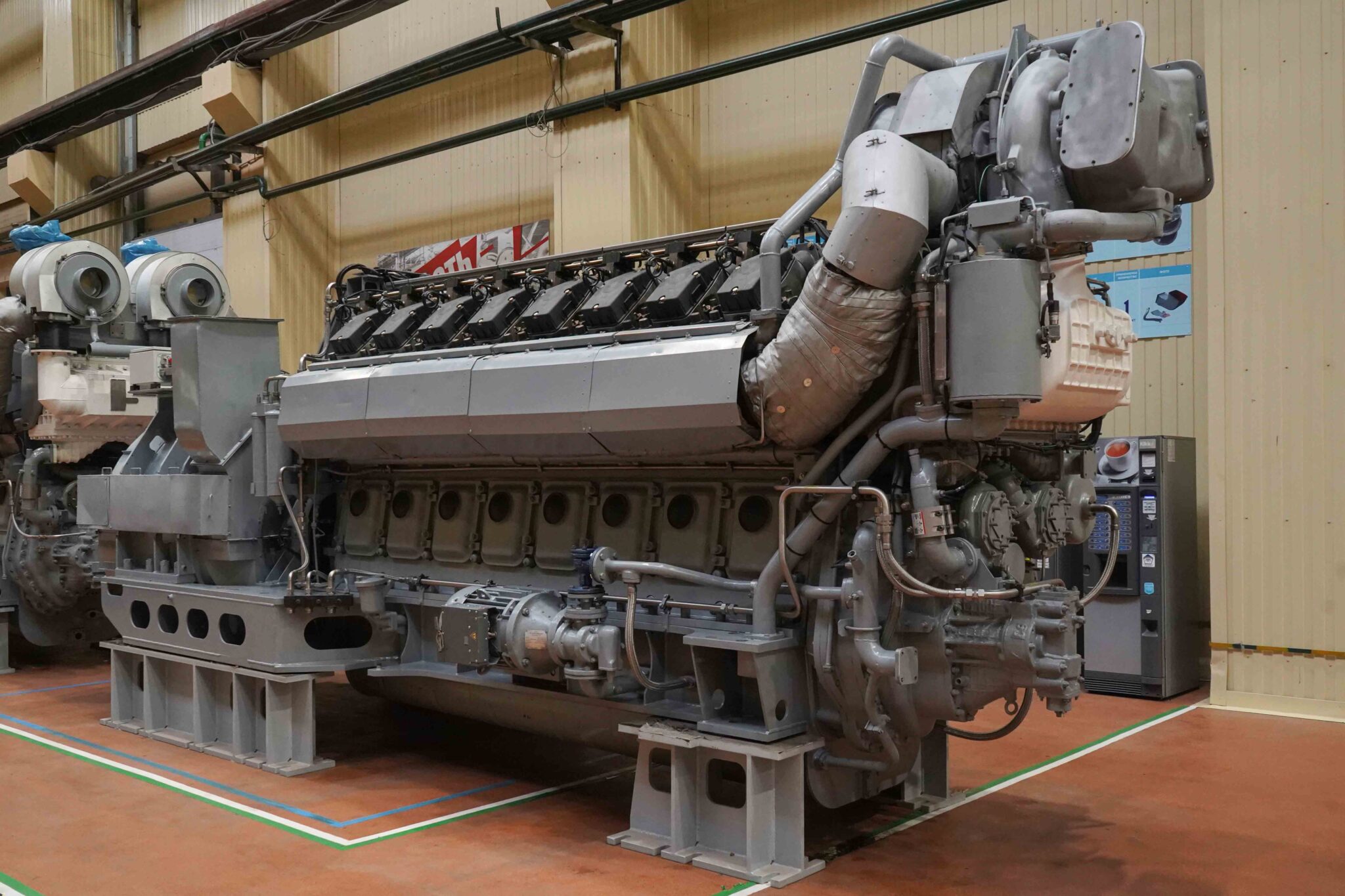 The 18-9DGM diesel engine for 3TE28 mainline diesel locomotives. Source: kolomnadiesel.com
The 18-9DGM diesel engine for 3TE28 mainline diesel locomotives. Source: kolomnadiesel.com
The Bryansk Engineering Plant develops another promising diesel locomotive, TE30, which is primarily intended for the implementation of the national project on the development of the Baikal-Amur Mainline and Trans-Siberian Railway. The locomotive will be equipped with the 16LDG220 diesel engine with a rated maximum power of 3,300 kW at 1000 rpm, and specific fuel consumption at a rated power of 215+10.75 g/kWh. The emissions comply with Stage IIIA.
This summer saw the completed acceptance tests of the most powerful diesel engine ever produced by the Kolomna Plant, 20EDG500. It is a part of the 6.3 MW diesel genset that will backup power supply to the Kursk II Nuclear Power Plant. The engine consumes as little fuel and oil and has as long service life and as small responsiveness as its foreign analogues. A TMH–Rosatom agreement on the delivery of diesel generator sets with new engines was made in 2022.
Success outside of Russia
New products of the Kolomna Plant have great export opportunities. From 2025 to 2027, TMH plans to supply 20 high-power D500 engines to Egypt for its first nuclear power plant, El Dabaa, which is built now with the participation of Rosatom.
Under an agreement between TMH and the Belarusian Automobile Plant, a 1,700 kW medium-speed eight-cylinder 16-36DG diesel engine was developed for the 220 t dump truck BELAZ-75304. It is more durable and requires fewer maintenance costs than analogues by foreign manufacturers, and can be installed either in new trucks or during engine replacement. The dump truck, which earlier used a Cummins diesel engine, is now tested at a quarry in the Kuznetsk Basin, one of the largest coal mining areas in the world.
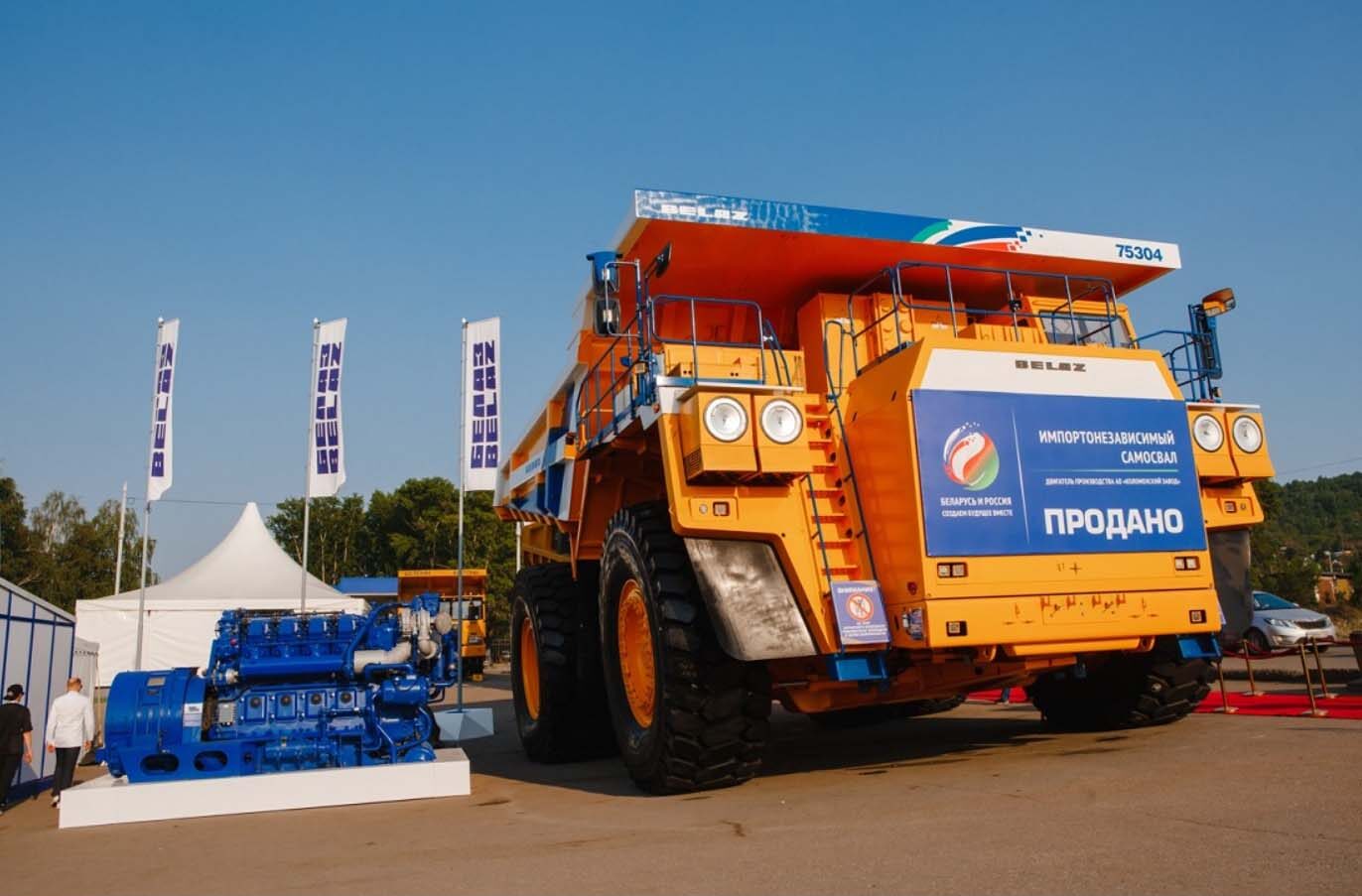 BELAZ-75304 with the 16-36DG diesel engine by the Kolomna Plant at the Coal and Mining exhibition in Novokuznetsk, Russia. Source: kolomnadiesel.com
BELAZ-75304 with the 16-36DG diesel engine by the Kolomna Plant at the Coal and Mining exhibition in Novokuznetsk, Russia. Source: kolomnadiesel.com
By the end of 2023, it is planned to produce at least 20 16-36DG engines for a pilot batch of upgraded BELAZ trucks.
Solutions for small-scale generation and alternative traction projects
Under an agreement between the Government of the Chuvash Republic, the project operator, and TMH ER, a network of small cogeneration plants equipped with 1-9GMG gas reciprocating engines by the Kolomna Plant will be created in the republic. In June 2023, TMH ER signed this agreement worth over RUB 5 bln ($52 mln), which allows the company to implement a project in one of its areas of interest, the replication of small-scale generation plants across the country. Small cogeneration plants like those in the republic can operate for up to 20 years and have an estimated payback of five years.
Developed in 2022, the 900 kW eight-cylinder 1-9GMG V-engine for liquified natural gas (LNG) was already tested and is now used at the power plants of the Kolomna Plant itself. Its specific gas consumption at full power is 207+10.35 g/kWh. 80% of its components are used in classic diesel engine, D49, so the 1-9GMG does not require high maintenance costs and is easy to repair. The distributed fuel delivery system increases the responsiveness compared to engines with external fuel delivery. The 9GMG engine is also used in the TEM29 LNG-powered shunting locomotive developed in Bryansk.
By the end of this year, the Kolomna Plant intends to unveil a prototype engine for the 3TE30G mainline locomotive powered by LNG. This will be a 16-cylinder 3,300 kW gas-diesel 16GDG220 V-engine. Such attention to gas engines is explained by the expected growth in demand under the influence of the government, which stimulates LNG introduction in railway transport.
TMH ER offers environmentally friendly engines that operate not only on LNG. Together with Russian Railways, Rosatom and the Sakhalin Region, the company is developing hydrogen trains.
Penzadieselmash expands its product range
The plant focuses on the production of 1-PDG4D and 1-PDG4A diesel engines and two series of turbochargers for shunting locomotives and power plants. In the near future, Penzadieselmash plans to develop TKR radial turbochargers, and turbochargers for high-power D500 engines. Their expected overall production is up to 1,500 units per year. The plan will also offer overhaul and repair services for diesel generators. The 2023 programme provides for RUB 2 bln ($21 mln) of investments.
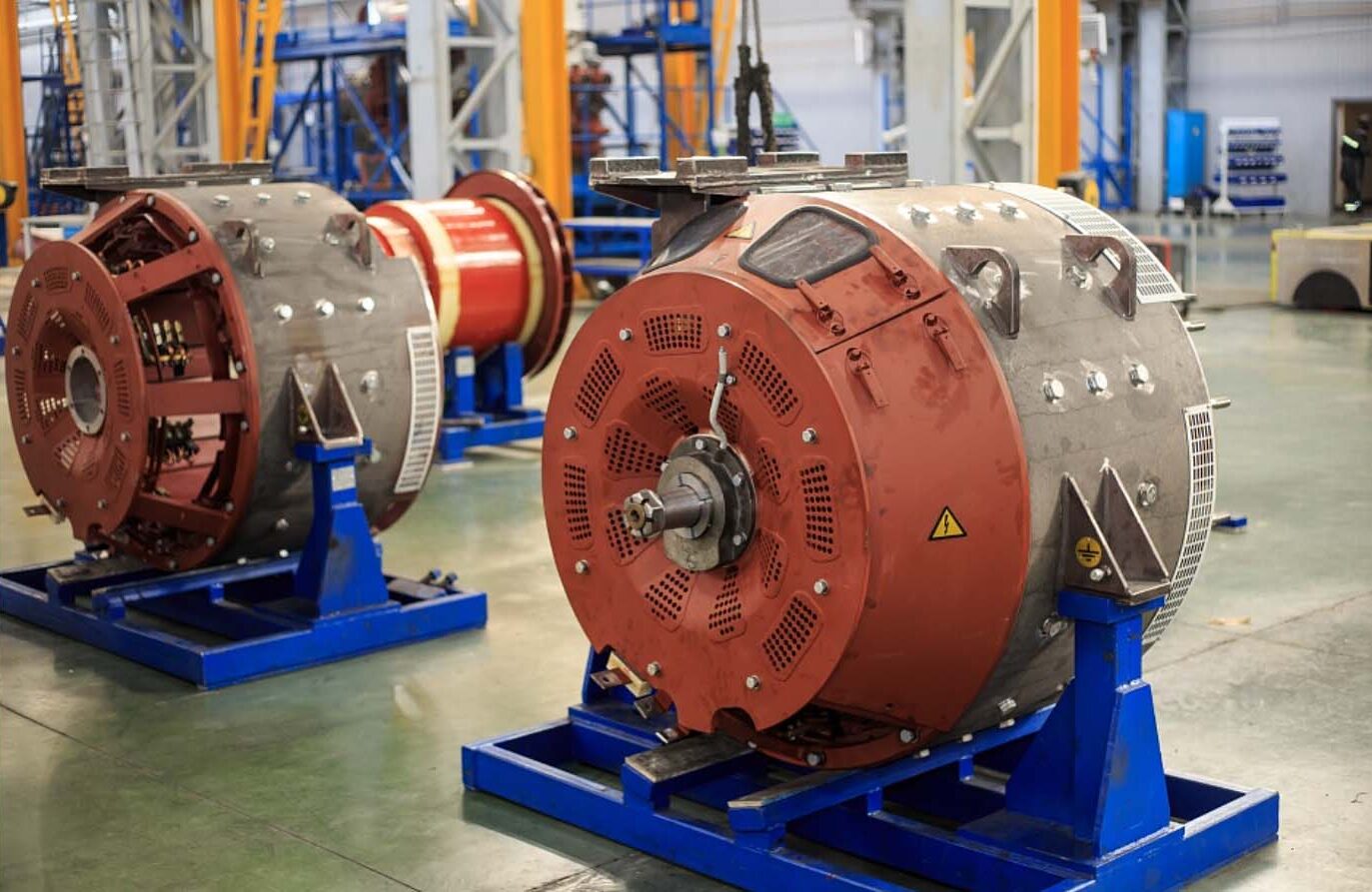 Russian-made generators GPP-840. In 2023, Penzadieselmash recertified their production. Source: pdmz.ru
Russian-made generators GPP-840. In 2023, Penzadieselmash recertified their production. Source: pdmz.ru
In 2020, during the previous stage of modernisation, the plant mastered the production of GPP-840 DC traction generators, which were previously supplied from Ukraine. The generators are designed for the flagship shunting locomotives by TMH, TEM18DM. By this September, Penzadieselmash has already produced 600 generators, while a total of 2,200 such diesel locomotives was produced for different countries.
TMH Elektrotekh produces engines for new locomotives, Ivolga, and metro trains
The importance of the transition from a commutator traction drive to a more efficient asynchronous one is highlighted in the Strategy for the Development of Railway Transport of the Russian Federation until 2030. Imported products and technologies that the industry relied on in this area need to be replaced. TMH Elektrotekh and TMH Engineering are consistently working on their own solutions for TMH’s rolling stock.
TMH Elektrotekh will receive RUB 6 bln ($63 mln) in investments by 2025. These funds will be used to increase the annual output of asynchronous traction motors for mainline locomotives by 35% to 5,700 units, and traction motors for electric trains and metro cars to 2,700 units, with the creation of about 500 jobs.
In 2023, two models of asynchronous traction motors were certified: DTA-200T for new shunting diesel locomotives TEM23, and DTA-380 for the latest modifications of electric trains EGE2Tv under the brand name Ivolga. EGE2Tv is the first serial multiple units with a designed speed of 160 km/h, entirely developed in Russia. Development batches of 42 and 180 motors respectively are expected to be produced by the end of the year. The first DTA-170 asynchronous traction motor for metro trains and DTA-125 for the unique Russian catenary-battery shunting locomotive EMKA2 are tested now.
The 3TE30G gas locomotive is expected to use TMH Elektrotekh products as well. This August, the manufacture of the prototype GTSN-3150 synchronous traction motor started. This engine has already been transferred to the Kolomna Plant for debugging the 16GDG diesel gas generator for the locomotive.
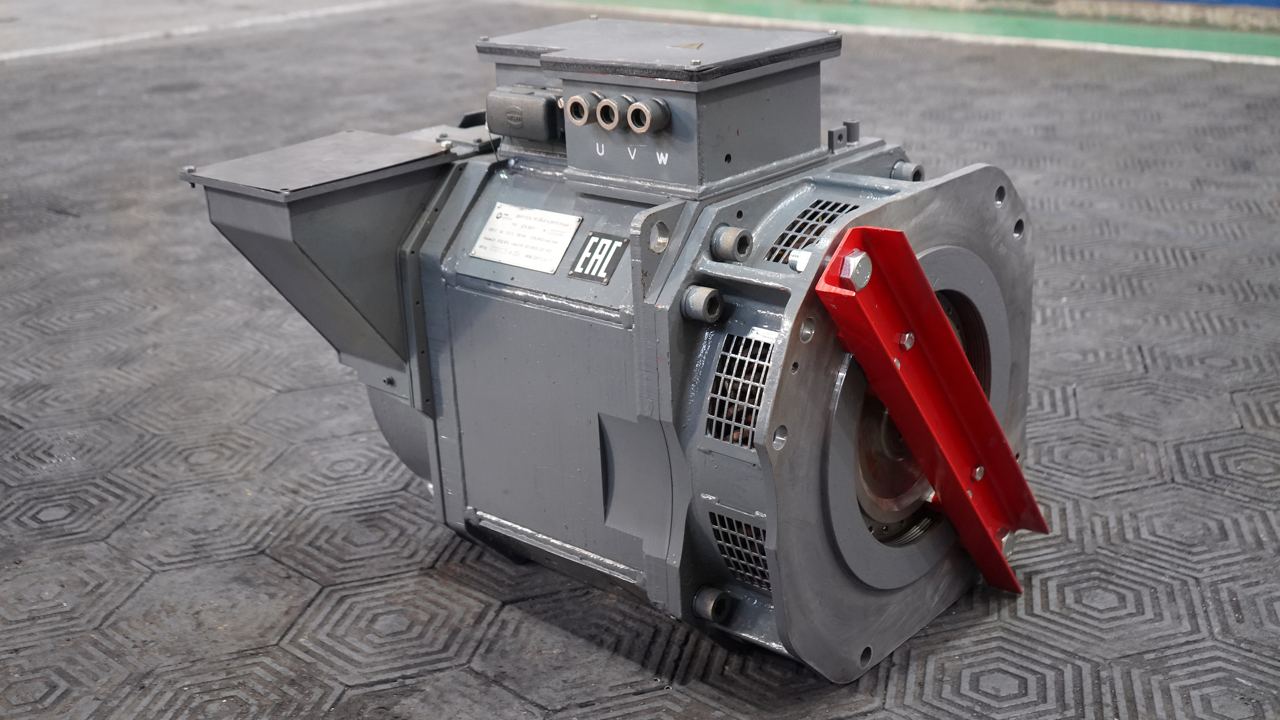 The asynchronous traction motor DTA-380 for Ivolga electric trains. Source: TMH
The asynchronous traction motor DTA-380 for Ivolga electric trains. Source: TMH
Another major production site of TMH ER is Zavod AIT, Russia’s largest producer of alkaline accumulators and batteries for railway transport. Its products are used in modern passenger cars and trains, mainline and shunting locomotives, and metro cars manufactured by TMH. As the holding’s backlog of orders grows, ZAIT’s production increases. Since the beginning of 2023, Zavod AIT has delivered 15% more accumulators and batteries compared to the last year. In the future, Zavod AIT intends to master the production of Li-ion batteries and energy storage systems based on them.
Quality service to TMH’s customers
Since its foundation, TMH ER has been focusing on high service standards. Like the entire holding, it offers after-sales support throughout the whole life cycle of its products, enhances repair capacities, and participates in the development, testing and operation of products of its customers. With digital tools, this work becomes as efficient as possible.
Its customers themselves initiate many innovations, which TMH ER specialists implement. While the synergy and active listening to customers are crucial for many years to come, the large-scale development programme, which TMH implements with the support of the state, will propel the Russian engine-building industry to a new and truly sovereign level.
***

TMH is the largest manufacturer of railway and urban rail transport in Russia and the CIS, ranking No. 5 globally. It offers a wide selection of products and services from the design and development of rolling stock to modernisation, life cycle maintenance, and digital traffic control systems. With its headquarters in Moscow, the Russian company has subsidiaries in Egypt, Belarus, and Kazakhstan. The holding embraces 12 production and assembly sites in Russia and other countries and works in more than 30 countries. Official website: Website: tmh.global.
Advertising. Erid: Kra249ytx





